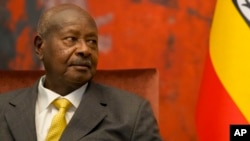The statement issued by the president's office didn't provide details on the Sept. 16 airstrikes targeting the Allied Democratic Forces, ADF, an extremist group allied with the IS group since 2019.
ADF was suspected in the June massacre of at least 41 people, most of them students, and other violence against civilians from bases in Congo's volatile east.
The airstrikes targeted four rebel camps located between 100-150 kilometers (62-93 miles) from the Uganda border, according to Museveni’s statement.
Uganda and Congo launched joint military operations against the ADF in 2021.
Meddie Nkalubo, a suspected Ugandan bomb maker with the ADF, was likely killed in the airstrikes, according to the statement.
ADF fighters sometimes conduct deadly raids across the border, including the attack in June on a school dormitory.
The ADF has long opposed the rule of Museveni, a U.S. security ally who has held power in the East African country since 1986.
The group was established in the early 1990s by Ugandan Muslims who said they had been sidelined by Museveni’s policies. At the time, the rebels staged deadly attacks in Ugandan villages and the capital, including a 1998 attack in which 80 students were massacred in a town not far from the scene of the June attack.
A Ugandan military operation had forced the ADF to flee to eastern Congo, where many rebel groups operate, taking advantage of the central government's limited control there. The ADF has since established ties with the Islamic State group.







Forum